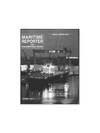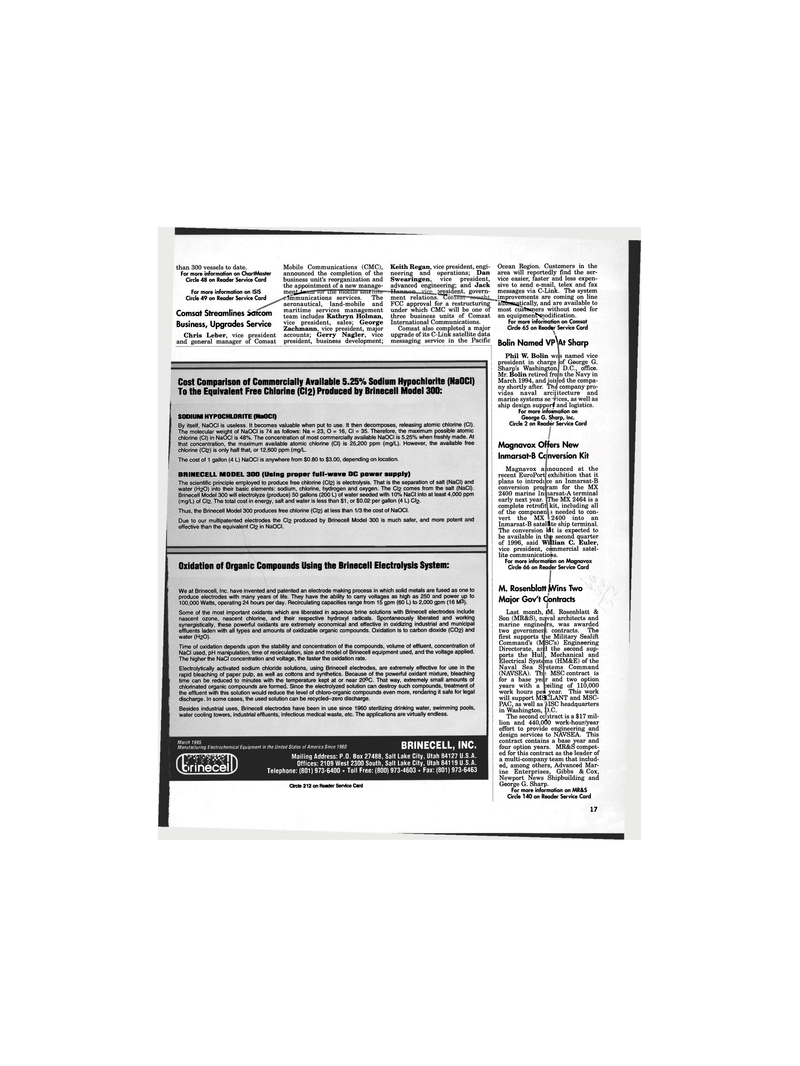
Page 15: of Maritime Reporter Magazine (December 1995)
Read this page in Pdf, Flash or Html5 edition of December 1995 Maritime Reporter Magazine
than 300 vessels to date.
For more information on ChartMaster
Circle 48 on Reader Service Card
For more information on ISIS
Circle 49 on Reader Service Card
Comsat Streamlines xncom
Business, Upgrades Service
Chris Leber, vice president and general manager of Comsat
Mobile Communications (CMC), announced the completion of the business unit's reorganization and the appointment of a new manage- merjU^uni ID! LUc liMJill Ldll"
Immunications services. The aeronautical, land-mobile and maritime services management team includes Kathryn Holman, vice president, sales; George
Zachmann, vice president, major accounts; Gerry Nagler, vice president, business development;
Keith Regan, vice president, engi- neering and operations; Dan
Swearingen, vice president, advanced engineering; and Jack president, govern- ment relations. Coi
FCC approval for a restructuring under which CMC will be one of three business units of Comsat
International Communications.
Comsat also completed a major upgrade of its C-Link satellite data messaging service in the Pacific
Cost Comparison of Commercially Available 5.25% Sodium Hypochlorite (NaOCI)
To the Equivalent Free Chlorine (CI2) Produced by Brinecell Model 300:
SODIUM HYPOCHLORITE (NaOCI)
By itself, NaOCI is useless. It becomes valuable when put to use. It then decomposes, releasing atomic chlorine (CI).
The molecular weight of NaOCI is 74 as follows: Na = 23, O = 16, CI = 35. Therefore, the maximum possible atomic chlorine (CI) in NaOCI is 48%. The concentration of most commercially available NaOCI is 5.25% when freshly made. At that concentration, the maximum available atomic chlorine (CI) is 25,200 ppm (mg/L). However, the available free chlorine (Cl2) is only half that, or 12,600 ppm (mg/L.
The cost of 1 gallon (4 L) NaOCI is anywhere from $0.80 to $3.00, depending on location.
BRINECELL MODEL 300 (Using proper full-wave DC power supply)
The scientific principle employed to produce free chlorine (Cl2) is electrolysis. That is the separation of salt (NaCI) and water (H2O) into their basic elements: sodium, chlorine, hydrogen and oxygen. The CI2 comes from the salt (NaCI).
Brinecell Model 300 will electrolyze (produce) 50 gallons (200 L) of water seeded with 10% NaCI into at least 4,000 ppm (mg/L) of CI2- The total cost in energy, salt and water is less than $1, or $0.02 per gallon (4 L) Cl2-
Thus, the Brinecell Model 300 produces free chlorine (CI2) at less than 1/3 the cost of NaOCI.
Due to our multipatented electrodes the CI2 produced by Brinecell Model 300 is much safer, and more potent and effective than the equivalent CI2 in NaOCI.
Oxidation of Organic Compounds Using the Brinecell Electrolysis System:
We at Brinecell, Inc. have invented and patented an electrode making process in which solid metals are fused as one to produce electrodes with many years of life. They have the ability to carry voltages as high as 250 and power up to 100,000 Watts, operating 24 hours per day. Recirculating capacities range from 15 gpm (60 L) to 2,000 gpm (16 M3).
Some of the most important oxidants which are liberated in aqueous brine solutions with Brinecell electrodes include nascent ozone, nascent chlorine, and their respective hydroxyl radicals. Spontaneously liberated and working synergistically, these powerful oxidants are extremely economical and effective in oxidizing industrial and municipal effluents laden with all types and amounts of oxidizable organic compounds. Oxidation is to carbon dioxide (CO2) and water (H2O).
Time of oxidation depends upon the stability and concentration of the compounds, volume of effluent, concentration of
NaCI used, pH manipulation, time of recirculation, size and model of Brinecell equipment used, and the voltage applied.
The higher the NaCI concentration and voltage, the faster the oxidation rate.
Electrolyfically activated sodium chloride solutions, using Brinecell electrodes, are extremely effective for use in the rapid bleaching of paper pulp, as well as cottons and synthetics. Because of the powerful oxidant mixture, bleaching time can be reduced to minutes with the temperature kept at or near 20°C. That way, extremely small amounts of chlorinated organic compounds are formed. Since the electrolyzed solution can destroy such compounds, treatment of the effluent with this solution would reduce the level of chloro-organic compounds even more, rendering it safe for legal discharge. In some cases, the used solution can be recycled-zero discharge.
Besides industrial uses, Brinecell electrodes have been in use since 1960 sterilizing drinking water, swimming pools, water cooling towers, industrial effluents, infectious medical waste, etc. The applications are virtually endless.
March 1995
Manufacturing Electrochemical Equipment in the United States of America Since 1960 >rinecel 1 the United States of America Since 1960 BRINECELL, INC.
Mailing Address: P.O. Box 27488, Salt Lake City, Utah 84127 U.S.A.
Offices: 2109 West 2300 South, Salt Lake City, Utah 84119 U.S.A.
Telephone: (801) 973-6400 * Toll Free: (800) 973-4603 * Fax: (801) 973-6463
Circle 212 on Reader Service Card
Ocean Region. Customers in the area will reportedly find the ser- vice easier, faster and less expen- sive to send e-mail, telex and fax messages via C-Link. The system improvements are coming on line "a!ItTM»4tically, and are available to most customers without need for an equipmenNnodification.
For more information on Comsat
Circle 65 on Reader Service Card
Bolin Named VpW Sharp
Phil W. Bolin we 3 named vice of George G.
D.C., office, n the Navy in ed the compa- company pro- itecture and as well as ces, president in charge
Sharp's Washington.
Mr. Bolin retired fro
March 1994, andjoii ny shortly after. Th vides naval arc" marine systems se: ship design support and logistics.
For more information on
George G. Sharp, Inc.
Circle 2 on Reader Service Card
Magnavox Offers New
Inmarsat-B Cc nversion Kit
Magnavox a inounced at the exhibition that it ce an Inmarsat-B for the MX early next year, complete retrofit of the componen vert the MX recent EuroPort plans to introdi conversion prog r; 2400 marine In: larsat-A terminal am
The MX 2464 is a kit, including all 3 needed to con- 2400 into an
Inmarsat-B satellte ship terminal.
The conversion kit is expected to be available in the second quarter of 1996, said Willian C. Euler, vice president, commercial satel- lite communications.
For more information on Magnavox
Circle 66 on Reader Service Card
M. Rosenblatt Mfins Two
Major Gov't Contracts
Last month, iM. Rosenblatt &
Son (MR&S), m val architects and marine enginei rs, was awarded two governmer ; contracts. The first supports t le Military Sealift
Command's (IV SC's) Engineering
Directorate, ar i the second sup- ports the Hul, Mechanical and
Electrical Syst< ms (HM&E) of the
Naval Sea S 'stems Command (NAVSEA). Th; MSC contract is for a base yei r and two option years with a leiling of 110,000 work hours pea year. This work " ^LANT and MSC-
ISC headquarters ).C. itract is a $17 mil- 30 work-hour/year effort to provide engineering and design services to NAVSEA. This contract contains a base year and four option years. MR&S compet- ed for this contract as the leader of a multi-company team that includ- ed, among others, Advanced Mar- ine Enterprises, Gibbs & Cox,
Newport News Shipbuilding and
George G. Sharp.
For more information on MR&S
Circle 140 on Reader Service Card will support ML
PAC, as well as 1 in Washington,
The second cc lion and 440,0C 17

 14
14

 16
16
